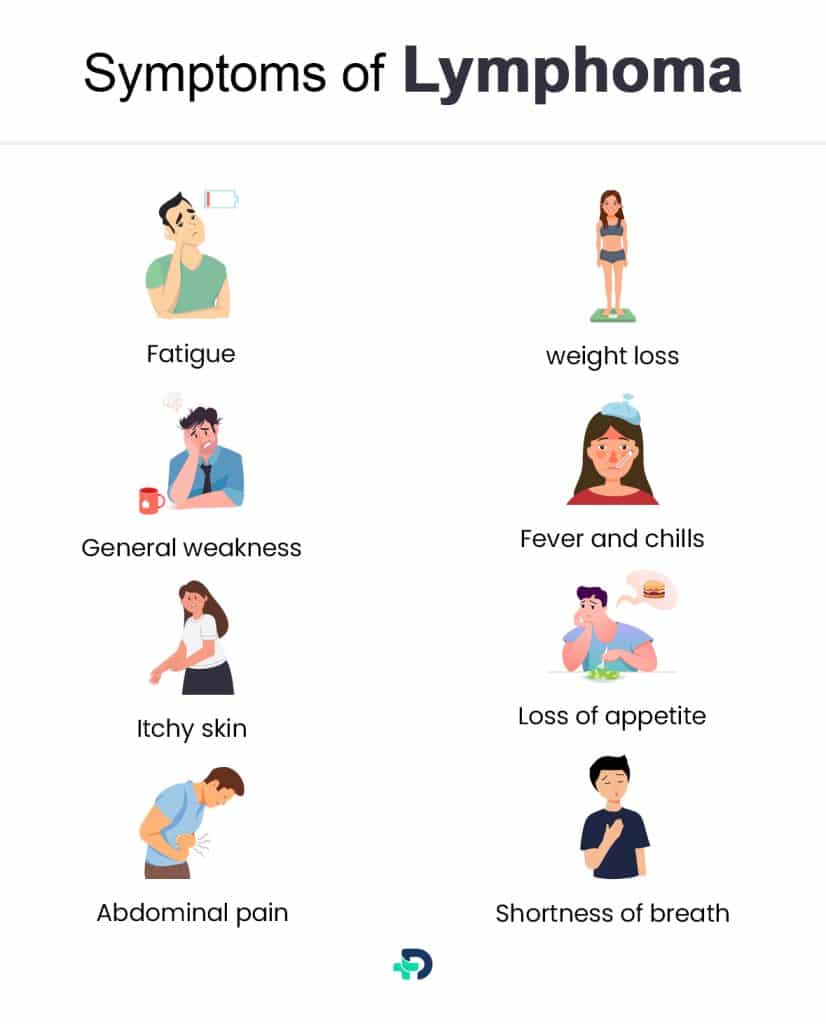What is Lymphoma? Types, Symptoms, and Treatment

- Lymphoma
- 17 Aug 2023
Overview
What is Lymphoma?
Lymphoma is a cancer that starts in the lymphatic system, an important part of the immune system of the body. It starts in lymphocytes, a kind of white blood cell, and can grow in the bone marrow, lymph nodes, thymus, and spleen, among other organs. It accounts for around 5% of all cancers.1Overview| Researched based study from Nlm.nih.gov
This article will provide an overview of lymphoma, including symptoms, causes, types, risk factors, diagnosis, treatment, prevention, consequences, and prognosis.

Types
Types of Lymphoma
Lymphoma is broadly classified into two main categories:
- Hodgkin lymphoma (HL)
- Non-Hodgkin lymphoma (NHL)
Hodgkin Lymphoma
- It represents 10% of all lymphoma1Types| Researched based study from Nlm.nih.gov
- It is distinguished by the detection of Reed-Sternberg cells in lymph nodes.2Types| Researched based study from Nlm.nih.gov
- It is further divided into Classical Hodgkin lymphoma (CHL) and Nodular lymphocyte-predominant Hodgkin lymphoma (NLPHL).
Non-Hodgkin Lymphoma
- It is a lymphoid tissue cancer that develops from T-cell precursors, B-cell precursors, and mature T-cells.3Types| Researched based study from Nlm.nih.gov
- It constitutes around 90% of all lymphoma cases1Types| Researched based study from Nlm.nih.gov
- NHL refers to a group of lymphomas subdivided based on the type of lymphocyte involved like B-cells, T-cells, or natural killer cells and the development pattern.
Symptoms

Symptoms of Lymphoma
Lymphoma symptoms can differ based on the stage and type of the cancer, and may include:
- Swollen lymph nodes.
- Unexplained weight loss.
- Fatigue.
- Night sweats.
- General weakness.
- Fever and chills.
- Itchy skin.
- Loss of appetite.
- Abdominal pain.
- Shortness of breath4Symptoms| Researched based study from Mayoclinic.org
- Persistent cough.
- Abdominal swelling.
Symptoms of end stage lymphoma
As lymphoma progresses to end-stage, all common symptoms start to get worse, which could include the following :
- Confusion.
- Pain.
- Fatigue.
- Loss of interest.
- Appetite loss.
- Drowsiness.
- Changes in breathing.
- Feeling cold.
- Inability to close the eyes.
- Loss of bladder control
- Loss of bowel control5Symptoms| Researched based study from Lymphoma-action.org.uk
Causes
What causes Lymphoma?
A Genetic Change
- The precise causes of lymphoma are unknown and poorly understood.
- Some evidences suggests that Lymphoma develops as a result of uncontrolled growth in white blood cells as a result of genetic alterations in the cells.
- A lymphocyte cell’s usual life period is brief, and ultimately the cell dies. However, in people with lymphoma, DNA mutations inside lymphocyte cells drive them to survive and spread rather than die.
Risk factors
Risk factors
Even though the following are a few risk factors for lymphoma, people who do not have these risk factors can nevertheless get these tumors:
- Hereditary – Having a sibling or a parent with lymphoma or another type of cancer may modestly enhance an individual’s risk.
- Age – Lymphoma can strike at any age, but certain types are more frequent in those over the age of 60.
- Gender – While certain lymphoma types affect both sexes equally, some are more common in males6Risk factors| Researched based study from Cancer.net
- Diet – People who consume a lot of fatty foods and meats are at a higher risk7Risk factors| Researched based study from Hematology.org
- Weakened immune system – Individuals with weaker immune systems, including those with HIV/AIDS or who have had organ transplants, are more likely to acquire lymphoma.
- Infections – Certain viral and bacterial infections, including Epstein-Barr virus infection (EBV), hepatitis B and C, the human T-lymphotropic virus (HTLV-1), and Helicobacter pylori, have been associated with an elevated risk of lymphoma8Risk factors| Researched based study from Nlm.nih.gov
- Environmental – exposure to specific pesticides,7Risk factors| Researched based study from Hematology.org ionizing rays from nuclear reactor accidents, atomic bombs, and medical radiation therapy can all raise the risk.6Risk factors| Researched based study from Cancer.net
Diagnosis
Diagnosis of Lymphoma
Lymphoma diagnosis entails a medical history review, a physical examination, and many diagnostic tests, including:
- Blood tests – to evaluate general health and find anomalies with the help of blood cell counts and other markers.
- Imaging tests – include X-rays, MRIs, abdominal ultrasounds, CT scans, and PET scans, are used to assess the size and location of lymphoma.
- Lumbar puncture or spinal tap – a tiny amount of spinal fluid is removed and examined9Diagnosis| Researched based study from Clevelandclinic.org
- Biopsy – Taking out and analyzing a sample of the tissue or lymph node that is impacted.
- Bone marrow aspiration and biopsy – to determine lymphoma cell involvement by evaluating bone marrow samples.
- Lymph node biopsy – to see if the affected lymph nodes contains lymphoma cells.
Treatment
Treatment of Lymphoma
Depending on the type, stage, and general health of the patient, the following treatments may be used to treat lymphoma
- Watchful waiting – without starting therapy right away may be advised, especially for slow-growing lymphomas that don’t show symptoms immediately.
- Chemotherapy – used as the sole therapy or along with other medicines, and may include medications that damage cancer cells and slow their growth7Treatment| Researched based study from Hematology.org
- Radiation therapy – cancer cells are targeted and destroyed using high-energy radiation.
- Immunotherapy – increases the body’s ability to recognize and combat cancer cells and may include CAR-T cell therapy, checkpoint inhibitors, and monoclonal antibodies.
- Targeted therapy – Cancer cells are selectively targeted by inhibiting certain chemicals involved in their development and survival in targeted therapy.
- Steroid therapy – Prednisolone and dexamethasone are the most often used corticosteroids in treating lymphoma.10Treatment| Researched based study from Lymphoma-action.org.uk
- Stem cell transplant – Healthy stem cells are infused to repair damaged bone marrow after high-dose chemotherapy.7Treatment| Researched based study from Hematology.org
Prevention
Prevention of Lymphoma
While there is no guaranteed way to prevent lymphoma, specific measures can potentially reduce the risk or detect the disease at an early stage
- Lead a healthy lifestyle.
- Protect against infections
- Manage immune system health
- Get regular health checkups
Lead a healthy lifestyle
- Maintain a healthy diet.
- Quit smoking11Prevention| Researched based study from Nlm.nih.gov
- Get regular exercise.
Protect against infections
- Engage in safe sex.
- Get vaccinated against viral diseases such as hepatitis B.12Prevention| Researched based study from Nlm.nih.gov
- Maintain proper hygiene.
Manage immune system health
- Manage illnesses that can impair immunity by seeking medical help immediately.
- Avoid immunosuppressive therapies that aren’t essential.
Get regular health checkups
- Regular medical examinations can assist in identifying any unusual alterations or symptoms that might point to lymphoma.
Complications
Complications occurs with Lymphoma
Lymphoma and its therapies can result in a variety of problems, including:
- Increased risks of infections.
- Anemia – inadequate red blood cell count.
- Decreased platelet count13Complications| Researched based study from Lymphoma-action.org.uk
- Low levels of white blood cells.
- Dry, scratchy throat.
- Sore mouth.
- Nausea.
- Vomiting.
- Sleep issues.
- Loss of hair.
- Damage to the nerves.
- Reduced fertility.
- Menopause begins early.
- Memory lapse.
- Inability to concentrate.
- Reduced attention span.
- Constipation
- Diarrhea
- Anxiety.
- Depression.
- Increased risk of heart problems.
- Other cancers like lung, breast, or skin cancer14Complications| Researched based study from Lymphoma-action.org.uk
Prognosis
Prognosis of Lymphoma
Lymphoma is a serious cancer. Thankfully, lymphoma therapies are becoming more effective, allowing individuals to live longer. The patient’s kind, stage, overall health, and responsiveness to treatment are just a few variables that might affect a patient’s lymphoma prognosis. Many patients obtain complete remission or long-term illness control as treatment advances. The outlook is excellent for certain low-grade lymphomas but can be more challenging for aggressive or advanced-stage ones. Regular medical exams are critical for early detection and treatment
Any feedback on this article?
 This Articles content was accurate
This Articles content was accurate Very Informative Article
Very Informative Article I have a question or a comment
I have a question or a comment
 This article contains inaccurate content
This article contains inaccurate content This article was not helpful
This article was not helpful I have a question or a comment
I have a question or a comment
We appreciate your helpful feedback!
Checkout our social pages
References
-
National Library of Medicine
Lymphoma | Overview
-
National Library of Medicine
Hodgkin Lymphoma | Types
-
National Library of Medicine
Non-Hodgkin Lymphoma | Types
-
Mayo Clinic
Lymphoma | Symptoms
-
Lymphoma Action
Lymphoma and the end of life | Symptoms
-
American Society of Clinical Oncology
Lymphoma - Non-Hodgkin: Risk Factors | Causes | Risk factors
-
AMERICAN SOCIETY OF HEMATOLOGY
Lymphoma | Causes | Risk factors
-
National Library of Medicine
Viral Causes of Lymphoma: The History of Epstein-Barr Virus and Human T-Lymphotropic Virus 1 | Causes | Risk factors
-
Cleveland Clinic
Lymphoma | Diagnosis
-
Lymphoma Action
Treatment for lymphoma | Treatment
-
National Library of Medicine
The dose-response relationship between tobacco smoking and the risk of lymphomas: a case-control study | Prevention
-
National Library of Medicine
The Possible Protective Effect of Hepatitis B Vaccine against Lymphomas: A Systematic Review | Prevention
-
Lymphoma Action
Side effects of lymphoma treatment | Complications
-
Lymphoma Action
Late effects of lymphoma treatment | Complications





































